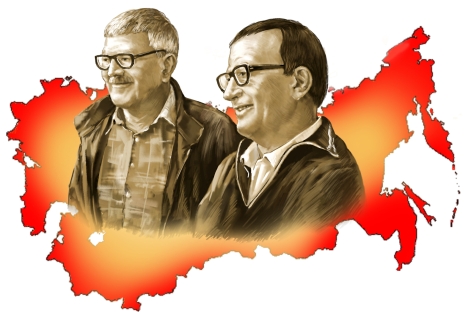In memory of Boris Strugatsky: How to live with the future

Drawing by Dmitry Divin. Click to enlarge the image.
I read the brothers Strugatsky in place of my ABCs. That is, I have read them ever since I can remember. And there is nothing strange about that. All the writers I love and read today grew up on the Strugatskys: Viktor Pelevin, Vladimir Sorokin, even Tatyana Tolstaya.
The Strugatskys were, without a doubt, the best science fiction writers in Russian literature; but even that sweeping description does not do them justice. The Strugatskys were broader and deeper than their genre and their time. That is why they found it so easy to cross the border that separated the old regime from the new – a feat managed by few other Soviet writers.
Moreover, the Strugatskys preserved continuity between what had been and what was to come; they connected, to the extent that such a thing is possible, the “thread of time.”
I can also say for a fact that the Strugatskys had a greater influence on their Soviet compatriots than not only Marx and Engels, but also Solzhenitsyn and Brodsky. It was they, not Brezhnev, who created the Soviet man as he was, as he lived through the tectonic shift of countries and eras.
The power of their impulse cannot be overestimated, because they alone (if one can say that about brothers) vindicated the fundamental myth of the entire Soviet regime. The Strugatskys gave meaning to the Marxist utopia. Like the last flash from a burned-out light bulb, their science fiction embodied the half-forgotten thesis about “happy labor.”
The Strugatskys looked into its roots, which had grown out of the future. Their symbol of faith was labor – a selfless and disinterested “subbotnik” (Soviet tradition of community service days) that turned workdays into paradise, the Philistine into a Communard and the half-animal into a half-god.
Such labor re-created the world in passing, while busy with other things. Its real object was not matter, but consciousness. Undergoing a transformation in the Tabor Light of communism, Strugatskys’ hero evolved from one book to the next, acquiring supernatural abilities and losing human traits.
This went on until he finally lost contact altogether with Homo sapiens and became a “humanoid” — a new creature who frightened even the authors. This hero had nothing in common with us or even with residents of the radiant future. Any utopia, if looked at too closely, becomes its opposite.
This is the subject of their best book, “The Snail on the Slope,” written during the last days of the Thaw. Only the sort of literary prejudice that relegates science fiction to a teenage ghetto prevents this work from being counted among the masterpieces of Russian literature.
Distorted by censorship, this book happily survived the epochal turning point; it slipped out of time into posterity, where it stands on a shelf not only with Swift and Saltykov-Shchedrin, but also with Borges. Expanding the limits of the genre to philosophical satire, “The Snail” became the profound and clear embodiment of the most insoluble conflict: the conflict between today and tomorrow.
“The future,” the Strugatskys remarked some 25 years later, “is never good or bad. It is never what we expected.”
Today, however, we are left not so much expecting the future, but “remembering” how the future was in their early books. In those books, the Strugatskys, ridding science fiction of its technological tendency, created a world in which they – and we – wanted to live.
The Strugatskys called it “Humanity’s High Noon.” The people of High Noon were like a group of students. They were smart, healthy, happy and busy with complex, abstruse, interesting things. The friendship of peoples reigned in this world where everyone found a place under the high sun.
Here there was a place for triumphs, unhappy love affairs and only minor absurdities. These minstrels of the future wander the Earth and its distant environs in search of risks, open to knightly adventures and, most importantly, engaging work. In “Escape Attempt” there is this dialogue:
“But you can’t work all the time…”
“You can’t,” said Vadim with regret. “I, for example, cannot. In the end, you reach an impasse and you have no choice but to amuse yourself.”
A little later, the Strugatskys expressed this idea in a succinct aphorism that became the title of their most popular story, “Monday Begins on Saturday.” In essence, this was the Soviet “HarryPotter.” In “Monday” the brothers committed not only a rationalization, but a bureaucratization of magic, by making it native, accessible and worthy of envy.
All of the Strugatskys’ readers dreamed of working at NIIChAVO (Scientific Research Institute of Sorcery and Magic), just as all fans of J.K. Rowling dream of going to school at Hogwarts.
In bidding Boris Strugatsky farewell, I remember with affection and tenderness those first, optimistic books. They were a genuine anthem of free labor, of people freely gathered together and beginning Monday on Saturday.
Alexander Genisis an author and journalist. He is the host of the weekly radiomagazine ‘American Hour’ (Radio Liberty) and a columnist for the independent investigative newspaper “Novaya Gazeta.”
All rights reserved by Rossiyskaya Gazeta.
Subscribe
to our newsletter!
Get the week's best stories straight to your inbox

